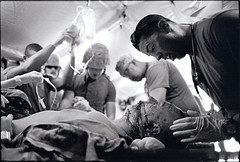Forcing us to see
Everyone, whether they supported the war or not, whether they feel a timetable for getting out of Iraq in an orderly fashion is vital or an invitation to insurgents to "wait us out," should see these photographs.
On the contrary, all we hear is that this type of thing is bad for morale. I don't know anything about being a soldier in Iraq (or dying of AIDS and TB in Indonesia), but it seems to me that reality is bad for morale, not photographs or names of the dead.
But those who most need to be forced to see -- those who think that "they" are betrying the troops -- are those least likely to look.
And at a military hospital in Germany, Mr. Nachtwey found Pvt. Andrew Bouwma in a coma, watched over by his stunned parents. His mother, Kandi, smiling in her University of Wisconsin sweatshirt, gently caresses his hair. His father, Jim, sunglasses perched on his head, rubs one eye and leans with his other hand on the railing of the bed for support. A chaplain’s hand, extending into the picture, touches Andrew’s shoulder. They’re praying. It’s frozen drama, like a Jeff Wall staging, but true. Breathing through a respirator, eyes shut, Private Bouwma looks heartbreakingly young.
Is this how these men would wish to be remembered? Are the pictures an invasion of privacy?
That was the Bush administration’s excuse for prohibiting photographs of returning coffins. But then there’s the argument made at the opening of the show at 401 by a ex-marine who lost his right arm in Iraq. (He was among a number of veterans who stopped by the gallery, a nonprofit space devoted to this sort of exceptional photographic projects, to pay tribute to Mr. Nachtwey.) The marine said he thought these pictures should be on billboards in Times Square so that everybody would know what’s really happening over there, and nobody could miss seeing them.
Wouldn’t that be something? Public art of real consequence and quality for a change, bringing home a war that the whole country is conducting but that only the small percentage of families in the volunteer military experience firsthand. There would be no chance to turn the page or flip the channel or skip the exhibition.
On the contrary, all we hear is that this type of thing is bad for morale. I don't know anything about being a soldier in Iraq (or dying of AIDS and TB in Indonesia), but it seems to me that reality is bad for morale, not photographs or names of the dead.
But those who most need to be forced to see -- those who think that "they" are betrying the troops -- are those least likely to look.



0 Comments:
Post a Comment
<< Home